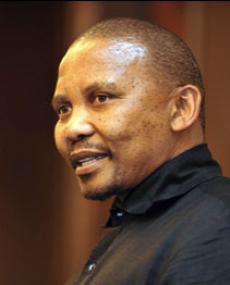
Chief of the AmaGebe Tribe. Chair of the Joint Constitutional Review Committee. He is President of the Congress of Traditional Leaders of South Africa. Holomisa is a member of the Unitra Council in the Eastern Cape.
Phathekile Holomisa was born on 26 August 1959 in the Eastern Cape. He went to the University of Natal during the mid 1980’s where he received a Bachelor of Law. During that time, he also obtained a Bachelor of Arts from the University of Transkei.
Subsequently, he sought out the ANC, which was in exile at the time, to get advice on whether or not he should take up his birth right to the chieftaincy of AmaHegebe in Mqanduli, situated in the Eastern Cape, in the Transkei legislature. They believed that this was a good idea and he then became chief and started working for the ANC behind closed doors. The ANC ended up providing him with a job in a law office in Umtata. He is credited with having played a pivotal role in encouraging other leaders to join him in supporting the nationalist future that the ANC foresaw for South Africa, at the time.
In 1989, he became an advocate for the High Court of South Africa, a position that he holds to this day.
In 1991, he became the second president of the Congress of Traditional Leaders of South Africa (CONTRALESA) following the murder of CONTRALESA’s first president, Chief Mhlabunzima Maphumulo. Shortly following this he became a negotiator in the CODESA (Convention for a Democratic South Africa) Multi-Party Negotiations for the Transkei delegation. He is the first prominent member of CONTRALESA to have officially voiced the view that traditional authorities, and not elected representatives, should be the primary form of government in the regions formerly known as the Bantustans. In 1993, his role as negotiator within CODESA ended.
In 1994, he was elected as a member of parliament as part of the ANC. After the first election, he was accused along with Winnie Mandela of having associated with chiefs who were in favour of independence in KwaZulu Natal. He was also accused of having been a main actor in the organization of boycotts against the 1995 elections. He opposed these elections because he believed that the ANC was not providing enough power and rights to traditional leaders and this motivated his more aggressive stance on the subject:
‘It’s becoming clear that the government listens only if you are aggressive. We want to co-operate but we are the guarantors of the rights of our people.’(Williams, 2010)
In 1999, his position as chief of the AmaHegebe tribe was recognized by Nelson Mandela in a speech, which he produced for his installation as chief. Mandela congratulated him and showed his support for Holomisa and addressed the role that he has played and continues to play in South African politics.
In 2002, he became a member of the University of Transkei (Unitra) Council and Chair of the Joint Constitutional Review Committee. He still holds both of these positions to this day.
He also has made many statements against the ANC, accusing them of using traditional leaders for their own political gain as evidenced by the large sums of money and luxuries, such as cars, which the ANC provided to traditional leaders in 2004, right before the elections held that year. He has since been reelected in every single election and to this day he still is a member of parliament.
In 2011, he published a book entitled A Double-Edged Sword, which outlines the history and formation of CONTRALESA.
This article was written by Savannah Seara-Robitaille and forms part of the SAHO Public History Internship